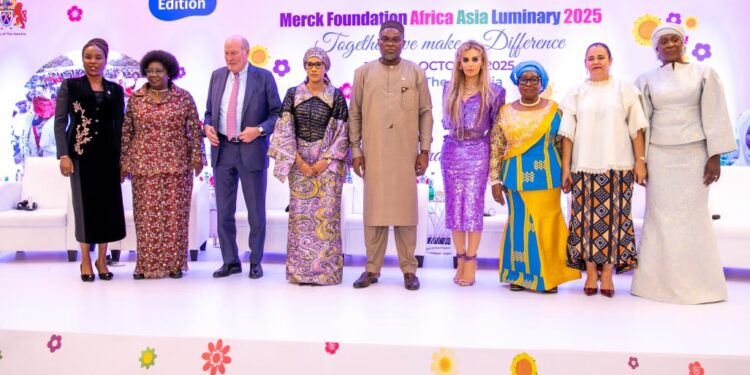By Ebere Agozie
The Chief Executive Officer of Merck Foundation, Dr Rasha Kelej says the foundation’s scholarships have transformed the patient care landscape in Africa.
Kelej disclosed this at the opening ceremony of the 12th Edition of Merck Foundation Africa Asia Luminary held in Gambia.
The meeting brought together First Ladies from across Africa, government ministers, healthcare experts, policy makers, and media professionals.
She said that the foundation in partnership with almost 30 African First Ladies has been a powerful force in the transformation witnessed in the health sector across Africa.
The CEO noted that several programmes of the foundation have provided scholarships and training for healthcare professionals, support for women with fertility challenges, as well as sustained campaigns against gender-based violence and child marriage.
“Through the partnerships we have awarded more than 2,400 scholarships to doctors and healthcare providers from 52 countries since 2012 creating the first oncologists, diabetologists, and fertility specialists in several nations.
“Before our intervention, some countries like Burundi, Liberia, Sierra Leone, and The Gambia had no specialists in key fields such as oncology, fertility, or ICU system. Patients either had to travel abroad or had no access to treatment at all.
“It’s really an amazing programme, and these scholarships have actually transformed the patient care landscape in the public sectors in all these countries. Today, we are changing that story,’’ she said.
She noted that for The Gambia, the partnership’s impact has been nothing short of transformational.
“94 healthcare professionals in The Gambia have benefitted from Merck Foundation scholarships, a remarkable number for a small country, strengthening local capacity in oncology, respiratory care, pediatrics, and reproductive medicine’’.
She reiterated Merck Foundation’s resolve to continue to strengthen its partnership with stakeholders to expand opportunities for women and girls to access quality education and healthcare for improved participation and contribution to global society.
Nigeria’s First Lady, Sen. Oluremi Tinubu, in her remarks, stressed the importance of robust and positive collaborations as vital sources of hope for families across Nigeria in building stronger health systems and expanding educational access.
She commended the Merck Foundation for its interventions that Nigerian doctors have benefited from through multiple scholarships.
“These scholarships include 14 for a one-year diploma in fertility and embryology, and a two-year master’s degree in sexual and reproductive care, women’s health, and family medicine.
“Other scholarships include 40 for diplomas and master’s degrees in diabetes, endocrinology, preventive cardiovascular medicine, cardiology, obesity, and weight management, as well as three for oncology research, medical oncology, and pain management’’.
Prof. Frank Stangenberg-Haverkamp, Chairman Merck Foundation Board of Trustees lamented the impact of mass exodus of healthcare workers in the African health sector, which has led to a shortage of medical and healthcare personnel.
He said that Merck Foundation’s long-term goal was not only to train individuals but also to transform the entire healthcare system by building sustainable local expertise that reduces medical tourism and saves lives.
Stangenberg-Haverkamp stressed the need for Africa to urgently build human capacity in healthcare, lamenting that the shortage of medical and healthcare personnel has been one of the most critical barriers to accessing quality healthcare across the continent.
“Africa carries 24 per cent of the world’s disease burden but has only a few healthcare workers per 1,000 people. Our scholarships aim to bridge this gap. Many of our alumni are now the first specialists in their countries.
“We believe that good healthcare can transform the lives of individuals and families across developing countries. Its significance contributes to the economic and social development of any country because healthcare is a major driver of both,” he added.
He also disclosed that the foundation’s training programmes currently span 44 critical specialities from oncology, endocrinology, and cardiovascular medicine to clinical psychiatry and neonatal care.
First Lady of The Gambia, Madame Fatoumatta Bah-Barrow, also lamented that Africa still witness an overburdened and under-resourced health sector.
She said that about 100 Gambian doctors have thus far received scholarships over the years from the Foundation to advance their training and bolster the country’s public health sector.
“Together, we are empowering professionals, uplifting women and giving the next generation of Africans a healthier, more hopeful future.
“Educated girls grow into empowered women who drive social and economic development, therefore health and education must go hand-in-hand.
“As First Ladies, we are not only symbolic figures, we are mothers, caregivers, and servants with a unique platform to uplift the voices of the vulnerable and marginalized, ensuring that no one is left behind,” she added.






